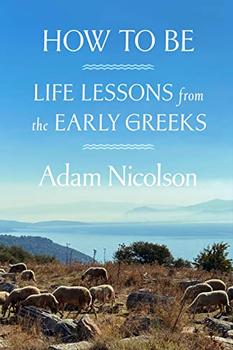
Life Lessons from the Early Greeks
Nicolson crafts a geography of the ancient world and a brilliant exploration of our connections to the past.
In How to Be, Adam Nicolson takes us on a glorious, immersive journey. Grounded in the belief that places give access to minds, however distant and strange, this book reintroduces us to our earliest thinkers through the lands they inhabited. To know the mental occupations of Homer or Heraclitus, one must visit their cities, sail their seas, and find landscapes not overwhelmed by the millennia that have passed but retain the atmosphere of that ancient life. Nicolson, the award-winning author of Why Homer Matters, uncovers ideas of personhood with Sappho and Alcaeus on Lesbos; plays with paradox in southern Italy with Zeno, the world's first absurdist; and visits the coastal city of Miletus, burbling with the ideas of Thales and Anaximenes.
Enhanced with maps, photographs, and artwork, How to Be provides a vital new way of understanding the origins of Western thought. It's an expedition into early ideas and a geography of our deepest preconceptions. Nicolson takes us to the dawn of investigative thought and a nexus of cross-cultural connection, and he makes the questions of the ancient world new again. What are the principles of the physical world? How can we be good in it? And why do we continue to ask these questions?
"Nicolson (The Life Between the Tides) illuminates in this meditative account the vital influence geography had on the evolution of Greek philosophy from the 11th to the 5th centuries BCE, arguing that places gave rise to frames of mind that served as wellsprings of new ideas ... Lyrical and insightful, this graceful analysis is an alluring must-read." ―Publishers Weekly (starred review)
"A must-read for anyone interested in philosophy, history, travel, art and the quest of human beings to comprehend themselves." —Kirkus Reviews (starred review)
"I'm not sure I've ever read a book that marries such profundity with such a mischievous sense of fun ... [How to Be] is like a net strung between the deep past and the present, a blueprint for a life well lived." ―Alex Preston, The Observer
"Seductive ... A poetic tour of philosophical thought." ―Thomas W. Hodgkinson, The Sepctator
"Nicolson's own gaze is deeply attentive ... He weaves ... a vivid picture that puts flesh on shadowy bones. He has infused his quest for wisdom with a sense of poetry." ―Noonie Minogue, The Tablet (UK)
This information about How to Be was first featured
in "The BookBrowse Review" - BookBrowse's membership magazine, and in our weekly "Publishing This Week" newsletter. Publication information is for the USA, and (unless stated otherwise) represents the first print edition. The reviews are necessarily limited to those that were available to us ahead of publication. If you are the publisher or author and feel that they do not properly reflect the range of media opinion now available, send us a message with the mainstream reviews that you would like to see added.
Any "Author Information" displayed below reflects the author's biography at the time this particular book was published.
Adam Nicolson writes books on history and the landscape. He was born in 1957, the son of the author Nigel Nicolson and grandson of Harold Nicolson and Vita Sackville-West. He was educated at Eton and Magdalene College, Cambridge. He has worked widely as a journalist (British Press Awards Feature Writer of the Year 1997, shortlist) and for many years wrote weekly columns in the Daily and Sunday Telegraph. He lives at Sissinghurst in Kent with his wife Sarah Raven and is the father of five children.
A New York Times bestselling author, a Fellow of the Royal Society of Literature and of the Society of Antiquaries in Scotland, Adam Nicolson has won many major awards including the Somerset Maugham Award, the W. H. Heinemann Award, and the Ondaatje Prize. His books include Why Homer Matters ...
Your guide toexceptional books
BookBrowse seeks out and recommends the best in contemporary fiction and nonfiction—books that not only engage and entertain but also deepen our understanding of ourselves and the world around us.